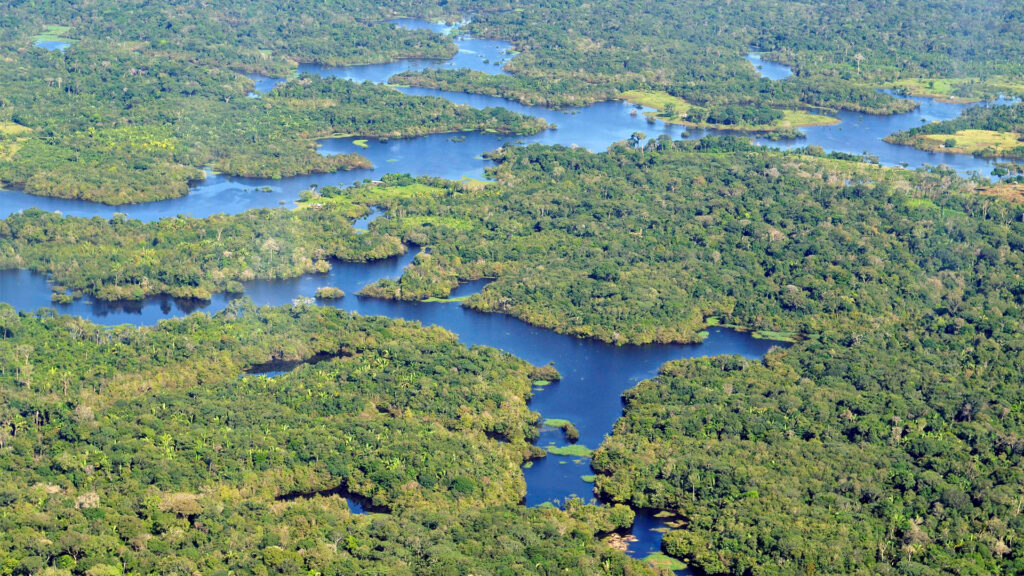By Christine Calvo, FIU News
Beyond the rainforests, scientists are zeroing in on changes occurring to a natural water cycle that could forever alter the Amazon.
The Amazon has always gone through periods of drought or abnormally heavy rainy seasons caused by the naturally occurring climate patterns of El Niño and La Niña. However, a recent increase in extreme climate events have led an international team of scientists to look more closely at the water cycles that connect the Atlantic Ocean to the Andes Mountains and distant parts of the Amazon. They have determined human activity could be impacting this natural water cycle through river alteration, deforestation and climate change.
Elizabeth Anderson, an FIU freshwater scientist who co-led the research, says she and the other scientists are calling for greater emphasis on freshwaters in Amazon conservation to protect this cycle. Their recommendations include better data collection, improved access to data for scientists and conservation managers, stronger collaborations and zero-deforestation policies to stop the cutting down of trees.
For many years, scientists have talked about the importance of the pathway for water between the Andes Mountains and the Amazon lowlands, but until now, the significance of the Atlantic Ocean was not as quickly recognized. In the new study published in PNAS, scientists are trying to raise awareness about the Andes-Amazon-Atlantic (AAA) pathway in hopes of greater consideration of this pathway and freshwater resources in Amazon conservation.

“In this century, there’s been a huge increase in the number and extent of protected areas like national parks, reserves and Indigenous territories that are recognized officially in the Amazon, but the focus has really been on forests and terrestrial ecosystems,” Anderson said. “It’s now time to extend support for conservation to freshwater systems like rivers.”
The AAA pathway is a giant, multi-directional water cycle that connects the Andes, Amazon and the Atlantic Ocean. About 90% of the Amazon Basin’s total sediment comes from the Andes Mountains, travels down the Amazon and other rivers, and flows into the Atlantic Ocean. As global temperatures rise and the Amazon grapples with deforestation, the chances for extreme climate events that could disrupt this cycle increase.
The Amazon region is home to 47 million people. Spanning eight countries and one territory, the Amazon is the Earth’s largest remaining rainforest. It sustains one-fifth of the world’s freshwater biodiversity and is home to some of the planet’s most diverse collections of birds, mammals, amphibians and plants. Its forests help mitigate global climate change. The future of the Amazon and its continued capacity to support the people, animals and plants living there fully depends on the connectivity of the AAA pathway.
Anderson points out an immediate need for integrated environmental management, conservation and governance approaches to sustain the AAA pathway. Within the scientists’ recommendations, they suggest monitoring of all components of the AAA system; coordination across political boundaries for improved data collection and management; strengthening collaboration between interdisciplinary researchers, water managers and local communities facing changes in the AAA pathway; and stopping deforestation, restoring vegetation and mitigating climate change in the Amazon.
“We hope this study will bring the AAA pathway to become a commonly recognized system, fostering a more holistic understanding of Amazon freshwaters and how they are connected with people and nature in other parts of South America and the world,” Claire Beveridge, FIU courtesy postdoctoral and co-lead of this study, said.
Funding for the study was provided by the Gordon & Betty Moore Foundation. In addition to Anderson and Beveridge, FIU researchers included Natalia Piland, Clinton Jenkins and Simone Athayde. Scientists from the Université Grenoble Alpes and the Université de Toulouse in France, Lancaster University in the U.K., the Pontificia Universidad Católica in Peru, University of São Paulo in Brazil, and Mississippi State University and Cornell University in the U.S. also contributed to this study.
This piece was originally published at https://news.fiu.edu/2024/scientists-call-for-conservation-of-amazons-unseen-water-cycle.
Sign up for The Invading Sea newsletter by visiting here. If you are interested in submitting an opinion piece to The Invading Sea, email Editor Nathan Crabbe at ncrabbe@fau.edu.



